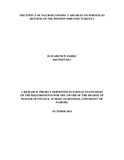| dc.description.abstract | Pension funds in Kenya have contributed significantly to the growth of financial markets
since they form one of the largest institutional investors. A stable economic environment
characterized by stable currency, inflation, and low interest rates has contributed to the
growth of pension fund portfolios and hence high returns. The research objective was to
establish the effect of selected macroeconomic variables on the performance of the Pension
fund industry in Kenya. The selected variables were those perceived by the researcher and
supported by previous empirical studies, to have the highest effect perceived effects on
industry returns. These were inflation rate, interest rates, exchange rate of dollar versus KES
and GDP growth rate. Industry return was taken to be the dependent variable while inflation
rate, interest rates, exchange rate and GDP growth rate were taken to be the independent or
predictor variables. The study also considered an error term as a representative of other non
key variables which had not been included in the model. The study period ranged from 2005
to 2013 within every quarter of a year, therefore consisting of 36 observations. The data was
analyzed using IBM SPSS version 20.Multivariate regression model was employed in the
study. To further ensure the model’s significance and goodness of fit, an F test and Analysis
of Variance (ANOVA) were used. The study established that pension funds’ industry return
was heavily influenced by the selected macroeconomic variables with exchange rate having
the largest influence and interest rates having the least impact. The computed R2 was
established to be of 0.533 which shows there is a positive and strong correlation between the
selected variables and industry returns. When expressed as a percentage, 53.3% of industry
returns is influenced by the variables while 46.7% or (100% - 53.3%) shows industry returns
affected by other variables not included in the regression, more specifically the error term.
The study findings established exchange rates, inflation rates and interest rates to be the
macroeconomic factors that have an inverse relationship with pension funds’ returns, with
GDP growth having a direct relationship. Therefore the findings of the study lends credence
and confirms the researcher’s theory that the performance of the pension fund industry is
affected by fundamental macroeconomic factors such as GDP growth, inflation, currency
exchange rate and interest rates. The aforementioned macroeconomic variables should be
closely monitored and taken into account by pension funds’ stakeholders and fund managers
while drawing up the investment policy statement and making investment decisions since
they have an effect on the overall performance of industry returns. | en_US |

